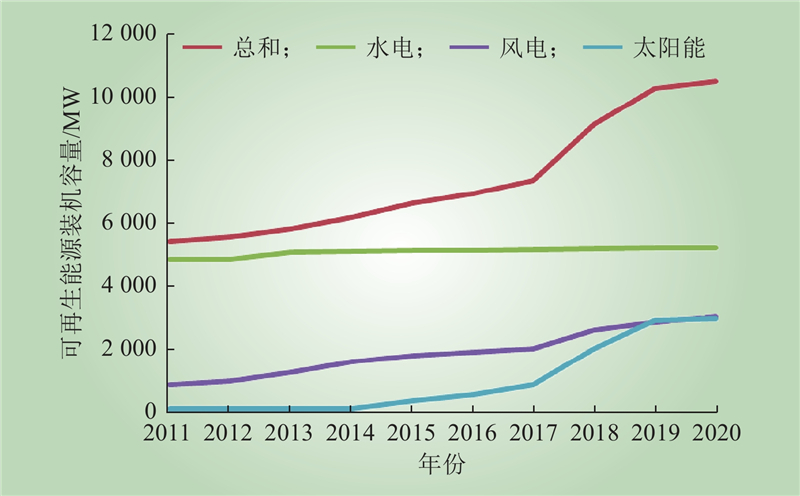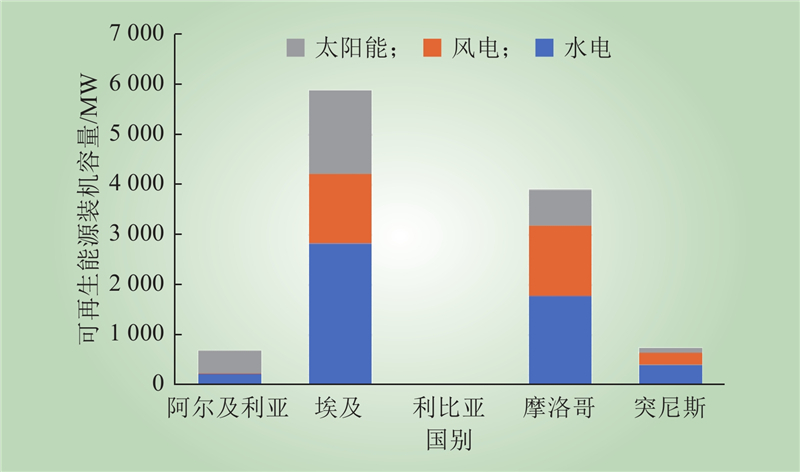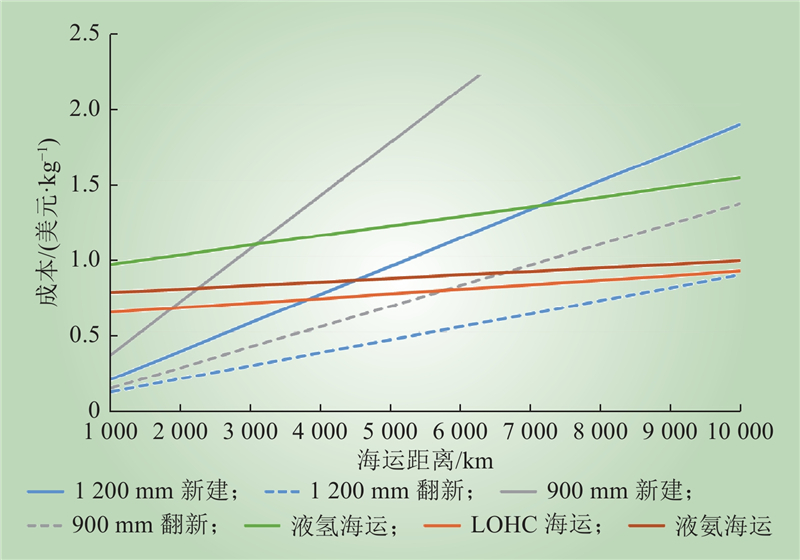| 1 |
Energy Transitions Commission. Making the hydrogen economy possible: accelerating clean hydrogen in an electrified economy [R/OL]. (2021-11)[2023-02-11]. https://www.energy-transitions.org/publications/making-clean-hydrogen-possible/.
|
| 2 |
European Union. A hydrogen strategy for a climate-neutral Europe[R/OL]. (2020-07)[2023-03-11]. https://ec.europa.eu/energy/sites/ener/files/hydrogen_strategy.pdf.
|
| 3 |
The World Bank. GDP growth-Middle East & North Africa[EB/OL]. (2021-11)[2023-03-11].https://data.worldbank.org/region/middle-east-and-north-africa.
|
| 4 |
Egyptian Government. Egypt Vision 2030[EB/OL]. (2021-11)[2023-01-18].https://mped.gov.eg/EgyptVision?lang=en.
|
| 5 |
IRENA. Renewables readiness assessment: The Republic of Tunisia[R/OL]. (2021-06)[2023-03-18]. https://www.irena.org/publications/2021/Jun/Renewables-Readiness-Assessment-The-Republic-of-Tunisia.
|
| 6 |
WIETSCHEL M, HASENAUER U. Feasibility of hydrogen corridors between the EU and its neighbouring countries[J]. Renewable Energy, 2007, 32 (13): 2129- 2146.
|
| 7 |
TIMMERBERG S, KALTSCHMITT M. Hydrogen from renewables: supply from North Africa to Central Europe as blend in existing pipelines-potentials and costs[J]. Applied Energy, 2019, 237, 795- 809.
|
| 8 |
CAVANA M, LEONE P. Solar hydrogen from North Africa to Europe through green stream: a simulation-based analysis of blending scenarios and production plant sizing[J]. International Journal of Hydrogen Energy, 2021, 46 (43): 22618- 22637.
|
| 9 |
董一凡. 欧盟氢能发展战略与前景[J]. 国际石油经济, 2020, 28 (10): 23- 30.
|
|
DONG Yifan. The development strategy and prospect of hydrogen energy in EU[J]. International Petroleum Economics, 2020, 28 (10): 23- 30.
|
| 10 |
周承商, 黄通文, 刘煌, 等. 混氢天然气输氢技术研究进展[J]. 中南大学学报(自然科学版), 2021, 52 (1): 31- 43.
|
|
ZHOU Chengshang, HUANG Tongwen, LIU Huang, et al. Research progress of hydrogen transport technology for blended hydrogen natural gas[J]. Journal of Central South University (Science and Technology), 2021, 52 (1): 31- 43.
|
| 11 |
张春雁, 窦真兰, 王俊, 等. 电解水制氢-储氢-供氢在电力系统中的发展路线[J]. 发电技术, 2023, 44 (3): 305- 317.
|
|
ZHANG Chunyan, DOU Zhenlan, WANG Jun, et al. Development route of hydrogen production by water electrolysis, hydrogen storage and hydrogen supply in power system[J]. Power Generation Technology, 2023, 44 (3): 305- 317.
|
| 12 |
IEA. North Africa's pathways to clean energy transitions[R/OL]. (2020-10-06)[2022-11-20].https://www.iea.org/commentaries/north-africa-s-pathways-to-clean-energy-transitions.
|
| 13 |
IRENA. Green hydrogen cost reduction – scaling up electrolysers to meet the 1.5 ℃ climate coal[R/OL]. (2020)[2022-11-30].https://www.irena.org/-/media/Files/IRENA/Agency/Publication/2020/Dec/IRENA_Green_hydrogen_cost_2020.pdf.
|
| 14 |
尚艳丽. 中东主要产油国加快推进能源转型[N]. 中国石油报, 2021-08-31(5).
|
| 15 |
尚艳丽, 张传进, 高超, 等. 中东地区能源转型进展浅析[J]. 国际石油经济, 2022, 30 (5): 83- 89.
|
|
SHANG Yanli, ZHANG Chuanjin, GAO Chao, et al. Analysis on the progress of energy transformation in the Middle East[J]. International Petroleum Economics, 2022, 30 (5): 83- 89.
|
| 16 |
Gas for Climate. Europe hydrogen backbone-analysing future demand, supply, and transport of hydrogen[R/OL]. (2021-06)[2022-11-30].https://gasforclimate2050.eu/wp-content/uploads/2021/06/EHB_Analysing-the-future-demand-supply-and-transport-of-hydrogen_June-2021.pdf.
|
| 17 |
Die Bundesregierung Bekennt. Die nationale wasserstoffstrategie[EB/OL]. (2020-06)[2022-11-30]. https://www.bmwi.de/Redaktion/DE/Publikationen/Energie/die-nationale-wasserstoffstrategie.pdf?__blob=publicationFile.
|
| 18 |
Ministreo Dello Sviluppo Economico. Strategia nazionale idrogeno linee fuida preliminari[R/OL]. (2021)[2022-11-30].https://www.mise.gov.it/images/stories/documenti/Strategia_Nazionale_Idrogeno_Linee_guida_preliminari_nov20.pdf.
|
| 19 |
Gas for climate: extending the European hydrogen backbone[R/OL]. (2021-04)[2022-11-30].https://gasforclimate2050.eu/wp-content/uploads/2021/06/European-Hydrogen-Backbone_April-2021_V3.pdf.
|
| 20 |
French Government. National strategy for the development of decarbonized and renewable hydrogen in France[R/OL]. (2020-03)[2022-11-30].https://www.bdi.fr/wp-content/uploads/2020/03/PressKitProvisionalDraft-National-strategy-for-the-development-of-decarbonised-and-renewable-hydrogen-in-France.pdf.
|
| 21 |
Secretary of State for Business. Energy & industrial strategy, UK hydrogen strategy[R/OL]. (2021-08)[2022-11-30]. https://assets.publishing.service.gov.uk/government/uploads/system/uploads/attachment_data/file/1011283/UK-Hydrogen-Strategy_web.pdf.
|
| 22 |
República Portuguesa. Portugal national hydrogen strategy[R/OL]. (2020-07)[2022-11-30].https://kig.pl/wp-content/uploads/2020/07/EN_H2_ENG.pdf.
|
| 23 |
European Union. A hydrogen strategy for a climate-neutral Europe[R/OL]. (2020-07)[2022-11-30]. https://ec.europa.eu/energy/sites/ener/files/hydrogen_strategy.pdf.
|
| 24 |
European Communication. The European green deal[R/OL]. (2019-12)[2022-11-30].https://ec.europa.eu/info/files/communication-european-green-deal_en.
|
| 25 |
European Commission. Impact assessment for communication "Stepping up Europe's 2030 Climate Ambition"[EB/OL]. (2020-09-17)[2022-11-30].https://knowledge4policy.ec.europa.eu/publication/communication-com2020562-stepping-europe%E2%80%99s-2030-climate-ambition-investing-climate_en.
|
| 26 |
The World Bank. Solar resource data: solargis[R]. 2017.
|
| 27 |
刘振亚. 全球能源互联网[M]. 北京: 中国电力出版社, 2015.
|
| 28 |
全球能源互联网发展合作组织. 非洲清洁能源开发与投资研究[M]. 北京: 中国电力出版社, 2020.
|
| 29 |
IRENA. Renewable energy statistic 2021[R/OL]. (2021)[2022-11-30].https://irena.org/-/media/Files/IRENA/Agency/Publication/2021/Aug/IRENA_Renewable_Energy_Statistics_2021.pdf.
|
| 30 |
Tahrir Institute for Middle East Policy. Tunisia's low-carbon energy transitions [EB/OL]. (2022-06-10)[2023-01-16].https://timep.org/2022/06/10/tunisias-low-carbon-energy-transitions/.
|
| 31 |
Renewable Energy Authority of Libya (REAoL). Libya renewable energy strategic plan 2013-2025[R/OL]. (2018-04)[2022-12-11].https://www.lse.ac.uk/GranthamInstitute/wp-content/uploads/2018/04/Enhancing_the_Penetration_of_Non_Programmable_RES_Generation.pdf.
|
| 32 |
Office National de l'Electricite et de l'Eau Portable. Rapport d'activite 2019[R/OL]. (2020)[2021-10-11]. http://www.one.org.ma/FR/pdf/Rapport%20d'activit%C3%A9s%20FR%202019.pdf.
|
| 33 |
Dii. The risk and opportunities of green hydrogen production and export from the MENA region to Europe[R/OL]. (2020-12)[2022-11-11].https://dii-desertenergy.org/wp-content/uploads/2020/12/Green-Hydrogen-from-MENA-to-Europe-Policy-Paper.pdf.
|
| 34 |
OCP Group. Sustainability report 2019[EB/OL]. (2019)[2022-11-29].https://corpo.ocpgroup.ma/en/sustainability-report-201.
|
| 35 |
BNEF. 2020 Saudi Arabia energy transition outlook[R]. 2020.
|
| 36 |
IEA. The future of hydrogen-seizing today's opportunities[R/OL]. (2019-06)[2022-12-11].https://iea.blob.core.windows.net/assets/9e3a3493-b9a6-4b7d-b499-7ca48e357561/The_Future_of_Hydrogen.pdf.
|
| 37 |
REIS P C, GLACHANT J M. Clean hydrogen costs in 2030 and 2050: a review of the known and the unknown[R/OL]. (2021-02) [2022-12-11].https://www.europeanfiles.eu/energy/clean-hydrogen-costs-in-2030-and-2050-a-review-of-the-known-and-the-unknown.
|
| 38 |
IRENA. Hydrogen: a renewable energy perspective[R/OL]. (2019-09)[2023-02-11].https://www.irena.org/-/media/Files/IRENA/Agency/Publication/2019/Sep/IRENA_Hydrogen_2019.pdf.
|
| 39 |
Gas pipelines across Mediterranee and Sahara[R/OL]. (2021-08-31) [2023-04-21].https://commons.wikimedia.org/wiki/File:Gas_pipelines_across_Mediterranee_and_Sahara_map-en.svg.
|
| 40 |
ENTSO-E. TYNDP 2020 scenario report[R/OL]. (2020-06)[2023-02-11].https://2020.entsos-tyndp-scenarios.eu/wp-content/uploads/2020/06/TYNDP_2020_Joint_ScenarioReport_final.pdf.
|
| 41 |
Forbes: Dual use LNG shipping: a gamechanger for carbon management?[R/OL]. (2019-02-28)[2022-12-11].https://www.forbes.com/sites/uhenergy/2019/02/28/dual-use-lng-shipping-a-gamechanger-for-carbon-management/?sh=54948501f471.
|
| 42 |
HURSKAINEN M, IHONEN J. Techno-economic feasibility of road transport of hydrogen using liquid organic hydrogen carriers[J]. International Journal of Hydrogen Energy, 2020, 45 (56): 32098- 32112.
|
| 43 |
BNEF. Hydrogen project valuation (H2Val) model[R]. 2022.
|
| 44 |
Material Economics. Mainstreaming green hydrogen in Europe[R/OL]. (2020-11-23)[2023-01-11].https://materialeconomics.com/201120-mainstreaming-gh2-powerpoint-vf.pdf?cms_fileid=45bf1a1a08f99feac8c25300a79fc88c.
|





